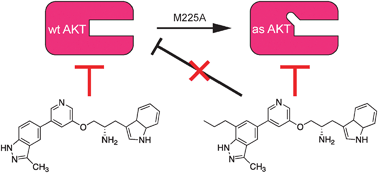Abstract
The

* Corresponding authors
a
Howard Hughes Medical Institute and Department of Cellular and Molecular Pharmacology, University of California, San Francisco, 600 16th Street, MC 2280, San Francisco, California 94158, USA
E-mail:
shokat@cmp.ucsf.edu
Fax: +1-415-514-0822
Tel: +1-415-514-0472
b Department of Chemistry, University of California, Berkeley, Berkeley, USA
c SelectScreen Services, Discovery Assays and Services, Cell Systems Division, Life Technologies Corporation, Madison, Wisconsin, USA
The

 Please wait while we load your content...
Something went wrong. Try again?
Please wait while we load your content...
Something went wrong. Try again?
T. Okuzumi, G. S. Ducker, C. Zhang, B. Aizenstein, R. Hoffman and K. M. Shokat, Mol. BioSyst., 2010, 6, 1389 DOI: 10.1039/C003917A
To request permission to reproduce material from this article, please go to the Copyright Clearance Center request page.
If you are an author contributing to an RSC publication, you do not need to request permission provided correct acknowledgement is given.
If you are the author of this article, you do not need to request permission to reproduce figures and diagrams provided correct acknowledgement is given. If you want to reproduce the whole article in a third-party publication (excluding your thesis/dissertation for which permission is not required) please go to the Copyright Clearance Center request page.
Read more about how to correctly acknowledge RSC content.
 Fetching data from CrossRef.
Fetching data from CrossRef.
This may take some time to load.
Loading related content
